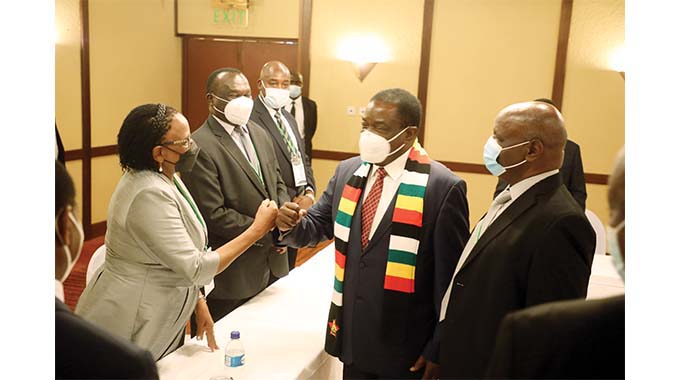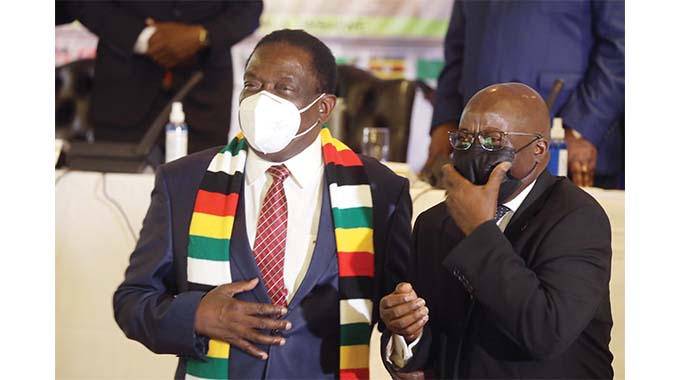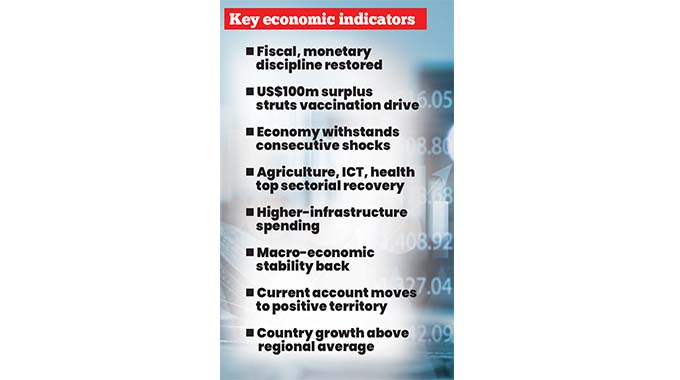WATCH: ‘Govt respects court decisions and orders’

Mashudu Netsianda, Senior Reporter
PRESIDENT Mnangagwa yesterday boldly affirmed that the Second Republic will continue to respect the independence of the judiciary and the principle of separation of powers in line with tenets of constitutional democracy.
Buttressing his statement while officially launching the Southern Africa Chief Justices’ Forum (SACJF), which is being jointly hosted by Zimbabwe and Zambia in Victoria Falls, the President added that the country has one of the most transparent systems in Africa in terms of the appointment of judges of the superior courts.

President Mnangagwa shares a moment with Malawian Chief Justice Andrew Nyirenda at the Southern Africa Chief JusticeS Forum conference and annual general meeting in Victoria Falls
Prospective judges are subjected to public interviews in terms of section 180 (4) of the constitution which provides guidelines on the appointment of judges of superior courts.
The law stipulates that the Judicial Service Commission (JSC) should invite members of public to select eligible candidates of their choice who will then be shortlisted for interviews, which are held under public glare.
“Allow me to emphasise that my Government respects the principle of separation of powers and the independence of the judiciary as a cornerstone of a constitutional democracy. We have one of the most transparent judges’ appointment systems in which prospective judges are subjected to public interviews by the Judicial Service Commission,” he said.
“Government, therefore, respects the decisions and orders of the courts and has put in place mechanisms to enforce those orders. This is indeed a fundamental aspect of the rule of law.”
The President said the need to respect the independence of the judiciary does not however, imply that judges should not be held accountable.
“An accountable and transparent judiciary is one that people can have uttermost confidence in and one that is free of corruption while also expeditiously dealing with and finalising matters before the courts,” he said.
“Judiciary independence is guaranteed as the essence of the rule of law on condition that the principles of transparency and accountability are observed in the performance of judicial functions.”
President Mnangagwa said the country has constitutionally entrenched tenure provisions that also protect the judiciary from the perceptions of victimisation.
He said the judiciary provides an essential service and implored delegates drawn from 11 countries to embrace information communication technologies (ICTs) and harness their potential in light of Covid-19.
“Even in such difficult times, you have an obligation to ensure that the wheels of justice do not grind to a halt. Justice must be kept alive and accessible to all. There is therefore, need for the judiciary to be innovative and come up with ways to continue dispensing justice,” said President Mnangagwa.
He said ICT is a strategic focus area of the Second Republic underpinning Vision 2030 which is aimed at achieving an upper middle-income status for the country’s economy.
“Allow me to also highlight that the use of ICT is a key strategic focus area of my government and underpins our vision to be a prosperous and empowered upper middle-income economy by the year 2030,” said the President.
He also noted that there is a compelling need for expeditious hearing and finalisation of commercial disputes by the courts as part of ease of doing business reforms.
“As such my Government facilitated the establishment of a stand-alone commercial court which specialises in commercial disputes. In addition, an integrated electronic case management system (IECMS) that allows for e-filing of documents, amongst other digital functionalities has been adopted,” said President Mnangagwa.
The IECMS seeks to take full advantage of the benefits of flexibility and automation of court processes which foster efficiency, transparency and improved access to justice.
Court procedures will be expedited while minimising direct human contact at certain stages of the process, thus eliminating opportunities for corrupt tendencies. “This will undoubtedly contribute to the efficiency of our courts in line best international standards,” he said.
The President said a “needs-based approach” is essential where specific requirements of particular communities are to be catered for.
“Wholesome implementation of the new technology-based innovations without taking into account such special needs of rural populations, has capacity to undo all our efforts towards breaking barriers to access to justice. In undertaking your work as the judiciary, you have an obligation to ensure that no one and no place is left behind,” he said.
“Our technological innovations must therefore be appropriately customised to meet those basic requirements.”
The President warned that security in the face of cyber-crime, which may threaten the efficacy and credibility of the systems, must be at the forefront when deploying computer-based technology in the administration of justice.
“The capacity of hackers and cyber criminals can only be ignored at our own peril. The need to guarantee privacy of confidential documents can, therefore not be over-emphasised and must be jealously guarded,” he said.
President Mnangagwa said lack of ICT connectivity and skills coupled with varying economic situations should not unduly infringe on people’s right to access to justice.
In his welcome remarks, Chief Justice Luke Malaba said the deployment of technology in handling court cases will bring transparency and eliminate corruption cases in the delivery of the justice system.
“The importance of technology as an enabler and efficient, effective justice administration system cannot be over emphasised in line with the current realities. Technology plays an important role in facilitating broad access to justice which remains threatened at the moment by the pandemic,” he said.
“The development and deployment of technology in the dispensation of justice has become a necessity that we can no longer afford to do without.”
CJ Malaba said some of the benefits which will be harnessed by the judiciary include the automation of court processes to ensure flexibility and expedited justice delivery.
“Technology also fosters transparency and a huge potential to eliminate opportunities for corruption due to the minimisation of human involvement in the process while also enhancing easy storage and retrieval of information by stakeholders,” he said.
“This web-based case management system automates and tracks all aspects of a case life cycle from initial filing through to disposition and brings together all justice system players under one platform.”
The SACJF conference is being held under the theme: “The Judiciary and technology in Africa” and is being attended by Chief Justices from Zimbabwe, Namibia (CJ Peter Shivute), Kenya (CJ Martha Koome, Botswana (CJ Terrance Rannowane), Malawi (CJ Andrew Nyirenda), Zambia (CJ Michael Musonda), Eswatini (CJ Bheki Maphalala, Uganda (CJ Alfonse Owiny-Dollo) and Zanzibar (CJ Omar Makungu).
Mozambique was represented by its Deputy Chief Justice Joao Antonio Baptista Beirao while Seychelles was represented by Justice Mathilda Twomey.
Justice, Legal and Parliamentary Affairs Minister Ziyambi Ziyambi, Matabeleland North Provincial Affairs and Devolution Minister Richard Moyo, Attorney General Advocate Prince Machaya, Prosecutor General Mr Kumbirai Hodzi and Justice Permanent Secretary Mrs Virginia Mabhiza are among key dignitaries who attended official opening. — @mashnets.











Comments